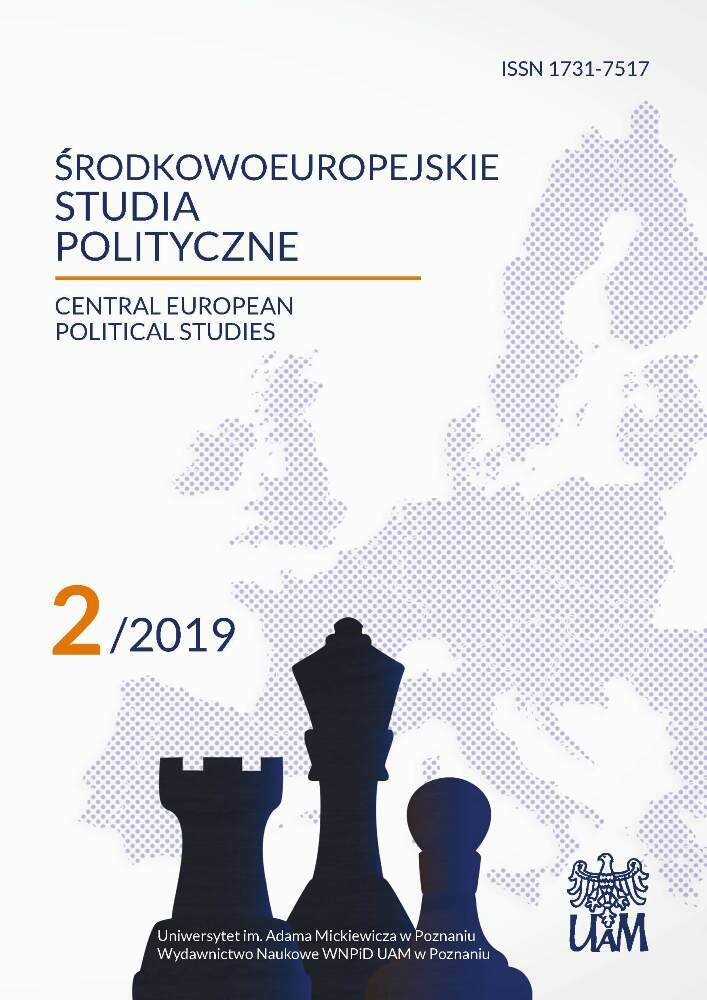Abstrakt
Przy wykorzystaniu autorskiego programu komputerowego wykonano symulacje głosowań w Radzie po wystąpieniu Wielkiej Brytanii z UE. W przypadku części z nich zastosowano innowację metodologiczną polegającą na odejściu od założenia, że powstanie każdej z możliwych koalicji jest równie prawdopodobne. Przeprowa dzona analiza wskazuje, że po Brexicie znacząco zmieni się zdolność członków Rady do tworzenia małych koalicji minimalnie blokujących. Jednocześnie ocena zdolności państw do blokowania decyzji w Radzie, dokonana w oparciu o Preventive Power Index, różni się zasadniczo od wyników analizy skupiającej się na budowie małych koalicji minimalnie blokujących. Prezentowane badania zostały sfinansowane przez Narodowe Centrum Nauki w ramach projektu no. UMO-2016/23/D/HS5/00408 (konkurs SONATA 12) zatytułowanego Wpływ brexitu i bezwarunkowego wprowadzenia systemu głosowania „podwójną większością” na proces decyzyjny w Radzie Unii Europejskiej.
Bibliografia
Aus J. P. (2008), The Mechanisms of Consensus: Coming to Agreement on Community Asylum Policy, in: Unveiling the Council of the European Union: Games Governments Play in Brussels, eds. D. Naurin, H. Wallace, Palgrave Macmillan, Basingstoke, pp. 99–119.
Bailer S., Mattila M., Schneider G. (2015), Money makes the EU go round: The objective foundations of conflict in the council of ministers, “Journal of Common Market Studies”, vol. 53, no. 2.
Baldwin R., Widgrén M. (2003), Decision Making and the Constitutional Treaty: Will the IGC discard Giscard?, CEPS Policy Brief 37.
Baldwin R., Widgrén M. (2005), The Impact of Turkey’s Membership on EU Voting, CEPS Policy Brief 62.
Brandsma G. J. (2015), Co-decision after Lisbon: The politics of informal trilogues in European Union lawmaking, “European Union Politics”, vol. 16, no. 2.
Bressanelli E., Koop Ch., Reh Ch. (2016), The impact of informalisation: Early agreements and voting cohesion in the European Parliament, “European Union Politics”, vol. 17, no. 1.
Bobay F. (2004), Constitution européenee: redistribution du pouvoir des États au Conseil de l’UE, “Économie et Prévision”, no. 163.
Clark J., Jones A. (2011), “Telling Stories about Politics”: Europeanization and the EU’s Council Working Groups, “Journal of Common Market Studies”, vol. 49, no. 2.
Coleman J. S. (1971), Control of Collectivities and the Power of a Collectivity to Act, in: Social Choice, ed. B. Liberman, Gordon and Breach, New York, pp. 269–300.
Farrell H., Héritier A. (2003), The Invisible Transformation of Codecision: Problems of Democratic Legitimacy, SIEPS Report No. 7, Stockholm: Swedish Institute for European Policy Studies.
Felsenthal D., Machover M. (1998), The measurement of voting power. Theory and practice, problems and paradoxes, Edward Elgar, Cheltenham.
Felsenthal D., Machover M. (2004), Analysis of QM rules in the draft constitution for Europe proposed by the European Convention, “Social Choice and Welfare”, vol. 23, no. 1.
Hayes-Renshaw F., van Aken W., Wallace H. (2006), When and Why the EU Council of Ministers Votes Explicitly, “Journal of Common Market Studies”, vol. 44, no. 1.
Häge F. M. (2013), Coalition- Building and Consensus in the Council of the European Union, “British Journal of Political Science”, vol. 43, no. 3.
Heisenberg D. (2005), The Institution of ‘Consensus’ in The European Union: Formal Versus Informal Decision-Making in The Council, “European Journal of Political Research”, vol. 44, no. 1.
Kleinowski M. (2012), Consensual Negotiations or Voting – Contestation of Legal Acts in the Council, “Studia Europejskie”, no. 4 (64).
Kleinowski M. (2012), The Council of the European Union Weighting System Influence on the European Commission Capability to Set the Agenda – Issues of the Measurement, in: Potęgometria III, eds. M. Sułek, R. Kobryński, Oficyna Wydawnicza ASPRA-JR, Warsaw, pp. 151–170.
Koczy L. (2012), Beyond Lisbon: Demographic Trends and Voting Power in the European Union Council of Ministers, “Mathematical Social Science”, vol. 63, no. 2.
Lewis J. (2007), The Janus Face of Brussels. Socialization and Everyday Decision Making in the European Union, in: International Institutions and Socialization in Europe, ed. J. T. Checkel, Cambridge, pp. 137–170.
Lewis J. (2008), Strategic Bargaining, Norms, and Deliberation, in: Unveiling the Council of the European Union: Games Governments Play in Brussels, eds. D. Naurin, H. Wallace, Palgrave Macmillan, Basingstoke, pp. 165–184.
Mattila M. (2008), Voting and Coalitions in the Council after the Enlargement, in: Unveiling the Council of the European Union: Games Governments Play in Brussels, eds. D. Naurin, H. Wallace, Palgrave Macmillan, Basingstoke, pp. 23–35.
Miller V., Taylor C. (2008), The Treaty of Lisbon: Amendments to the Treaty on European Union, House of Commons Research Paper 09.
Moberg A. (2007), Is the Double Majority Really Double? The Second Round in the Debate of the Voting Rules in the EU Constitutional Treaty, Working paper No. 290, Real Instituto Elcano, Madrid.
Mueller D. (2003), Public Choice III, Cambridge University Press, Cambridge.
Naurin D. (2010), Most Common When Least Important: Deliberation in the European Union Council of Ministers, “British Journal of Political Science”, vol. 40, no. 1.
Novak S. (2013), The Silence of Ministers: Consensus and Blame Avoidance in the Council of the European Union, “Journal of Common Market Studies”, vol. 51, no. 6.
Pollack M. A. (2003), The Engines of European Integration. Delegation, Agency and Agenda Setting in the EU, Oxford University Press, Oxford.
Protocol (No 36) on transitional provisions (2012), “Official Journal of the European Union” C 326.
Risse T. (2000), ‘Let’s Argue’: Communicative Action in World Politics, “International Organization”, vol. 54, no. 1.
Risse T. (2009), Social Constructivism and European Integration, in: European Integration Theory, eds. A. Wiener, T. Diez, Oxford University Press, Oxford, pp. 159–176.
Roederer-Rynning Ch., Greenwood J. (2015), The culture of trilogues, “Journal of European Public Policy”, vol. 22, no. 8.
Tallberg J. (2006), Leadership and Negotiation in the European Union, Cambridge University Press, New York.
Thomson R. (2011), Resolving Controversy in the European Union: Legislative Decision-Making before and after Enlargement, Cambridge University Press, Cambridge.
von Neumann J., Morgenstern O. (1944), Theory of Games and Economic Behaviour, Princeton University Press, Princeton.
Warntjen A. (2017), Do votes matter ? Voting weights and the success probability of member state requests in the Council of the European Union, “Journal of European Integration”, vol. 39, no. 6.


